Valeriy Hrynchak
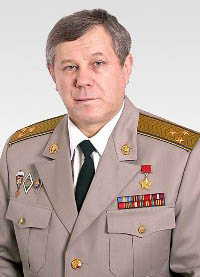
Valerii Hrynchak was born on June 21, 1957, in the village of Chemerpil, Haivoronskyi district, Kirovohrad region.
He finished 10 forms of Chemerpil secondary school with just two “good” marks in the certificate (the rest were “excellent” marks). After school he entered Kyiv Higher Combined Arms Command School which he graduated from in 1978.
He served in an air assault brigade in the Far East and in a reconnaissance battalion in Czechoslovakia.
It is his military experience and positive evaluations from all previous places of service that resulted in his appointment as a commander of reconnaissance troop of 285th armored regiment in October 1983 (in March 1984 the regiment was converted into 682nd mechanized infantry regiment) of 108th mechanized infantry division of the limited contingent of Soviet troops in the Democratic Republic of Afghanistan.
Engagement in combat started rapidly. Valerii Hrynchak had five days to take over the command of a reconnaissance troop of the regiment and on the sixth day he already had to ensure the protection of the commander of the division who had to take over the command of the division and study the situation in the area of responsibility of the division. The area of responsibility included 300 km from the city of Jalalabad (during the presence of Soviet troops in Afghanistan this was considered one of the most dangerous areas) to the settlement of Dashi. Salang mountain pass was also in the area.
On November 14, 1983, three weeks upon his arrival to Afghanistan, Hrynchak’s company already participated in a large-scale military operation.
Valerii Hrynchak approved himself a talented officer, performed well his duty which is recorded in many personal records of his superior commanders. However, the war changed demands. Each day he had to decide whom to delegate combat tasks. He’d prefer going himself in order to spare the responsibility of shaping other people’s destinies but one of hard necessary rules of war is the prohibition for the commander to go first on dismounted reconnaissance. The decisions to call artillery or aircraft to conduct a strike on settlements, where mujahideen were attacking by fire and remaining civilians, were extremely tough for him. But experience quickly proved necessity of such actions in order to save lives of his subordinates. Hrynchak excelled in this – while successfully conducting all combat operations he kept losses to minimum.
From the interview with V. Hrynchak: “I can say with confidence that for the first time I saw and realized the essence of true male friendship in Afghanistan. I understand that it sounds trite but it's true. War is like a litmus paper for the detection of traits of character, both noble and ugly ...”.
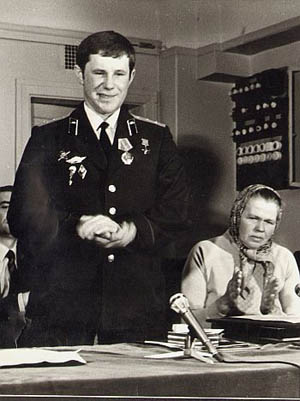
Soon after June 20, 1984, the reinforced reconnaissance detachment led by Hrynchak departed on a reconnaissance-searching mission. During two-day ambush the detachment managed to destroy a group of mujahideen and capture their commander. According to the testimony of the prisoner, verified by the radio intercept data, two more battalions were called to the mountains for reinforcement. Fighting in the insurgents’ base group area, Hrynchak’s detachment captured and destroyed the warehouses with ammunition, food and materiel of the enemy.
On 14 July, 1984, tired scouts were returning from successfully completed combat mission when a disguised high explosive mine exploded under commander’s feet. Hrynchak did not lose consciousness but during the first seconds he could not understand what had happened. He recovered soon and began giving orders – to remain in their places while a minesweeper carefully approached him (there are cases when fellow members try to help and suffer from mines placed nearby).
Every second was vital because the mine blew off one of his legs, and the other (later amputated in the hospital) was severely damaged: the joint was disrupted, blood vessels were ruptured, and fragments of bone scratched the face.
After resuscitation in Bagram medical facility, treatment in hospitals in Kabul, Tashkent, Burdenko hospital in Moscow, where he went through basic operations, Valerii Hrynchak arrived at the Central Scientific-Research Institute of Prosthetics named after Semashko and stayed there from November 1984 to May 1985, learning to walk on artificial limbs.
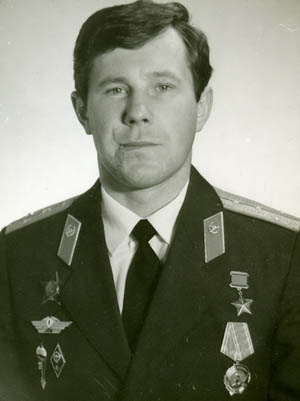
There he got to know about conferment of the title of Hero of the Soviet Union with the Order of Lenin and “Gold Star” medal.
From Valerii Hrynchak’s award letter: “Captain Hrynchak’s leadership skills were crucial during the clash with rebels on July 14, 1984. The company engaged in combat with an outnumbering gang of rebels and conducted it for several hours. During the ferocious fighting the officer was severely injured. Overcoming strong pain he provided medical care to himself. Showing a sample of boldness and courage, he did not leave the battlefield and continued to command the company. Servicemen, impressed by the heroism of their commander, did everything to achieve the victory ...”.
Either the State award or just strong morale encouraged Hrynchak to reject all the doubts and before release from the hospital he submitted a report to the Minister of Defence of the USSR with a request for a permission to stay in the Armed Forces.
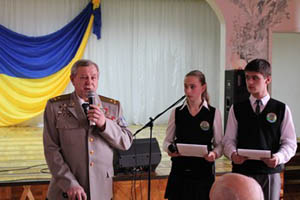
Few believed that he could succeed, but Valerii Hrynchak was granted the permission and from 1985 to 1992 he taught military history at his alma mater. And when he was to retire he entered the Law Faculty of the Kiev National University named after Taras Shevchenko. From 1995 to 2006, V. Hrynchak worked as an Assistant to the Chairman of the factory “Heliotrop” of the Ukrainian Union of Veterans of Afghanistan and since 1999 he is a consultant of Committee of the Verkhovna Rada (Supreme Council) of Ukraine on Matters of Pensioners, Veterans and Persons with Disabilities. Since 2002, he works on a voluntary basis as the Head of Control Inspection Commission of the National Assembly of Persons with Disabilities of Ukraine and as a consultant of Committee of the Verkhovna Rada of Ukraine on Matters of Pensioners, Veterans and Persons with Disabilities.
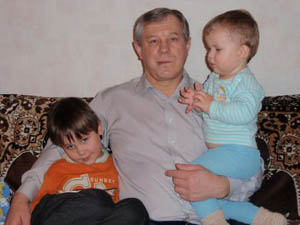
Today Valerii Hrynchak works fruitfully. He writes analytical articles about the problems of military intelligence. He actively participates in the events of the Defence Intelligence of Ukraine related to military patriotic education of the youth. He enjoys shooting sport in his free time.
Not only bravery on the battlefield or active public life during post-Afghanistan period but also his thirst for life after all the ordeals and warmth of his brave heart can be an example of courage. And the destiny gave him, perhaps, the most important award – he met the woman of his dream, who gave birth to two sons whom Valerii Hrynchak is raising real men and decent citizens of Ukraine.